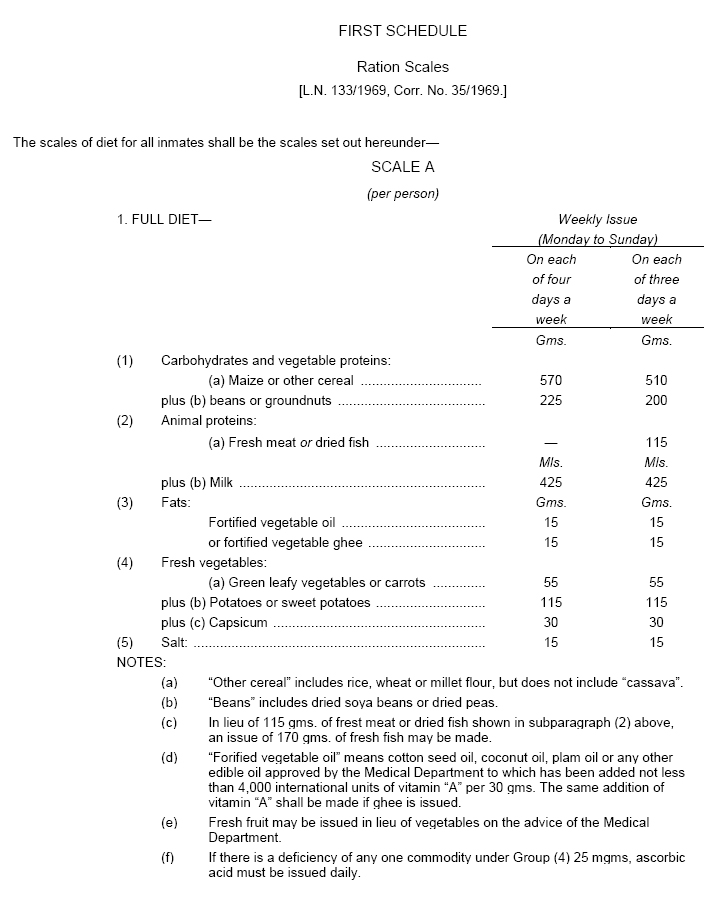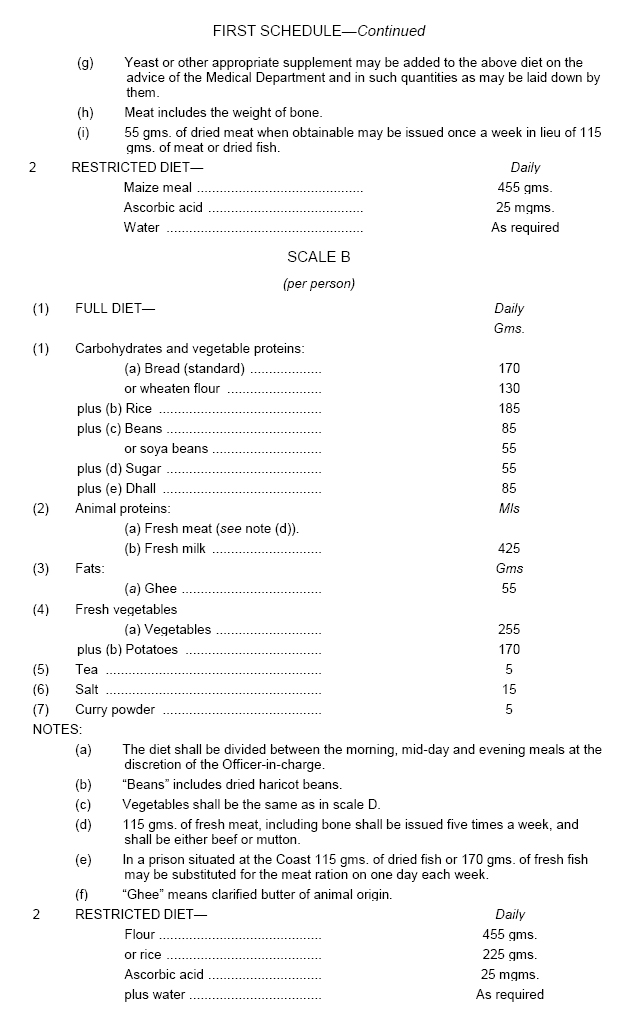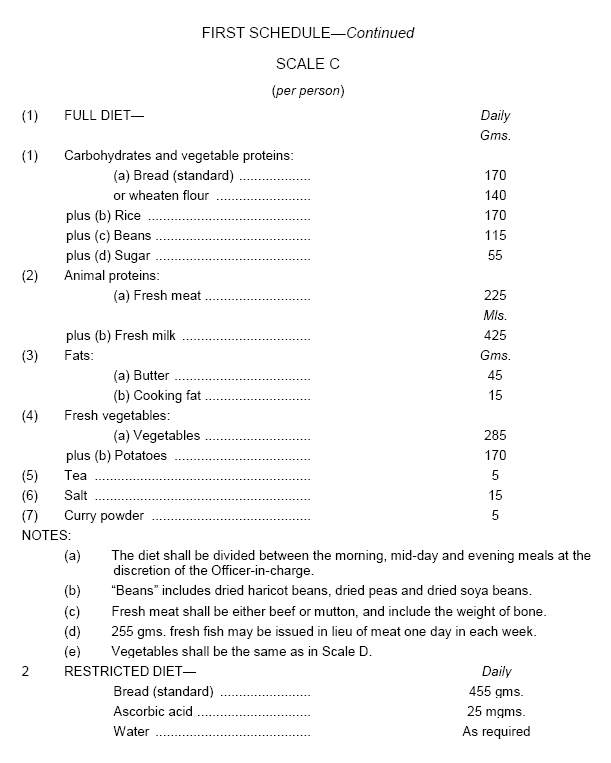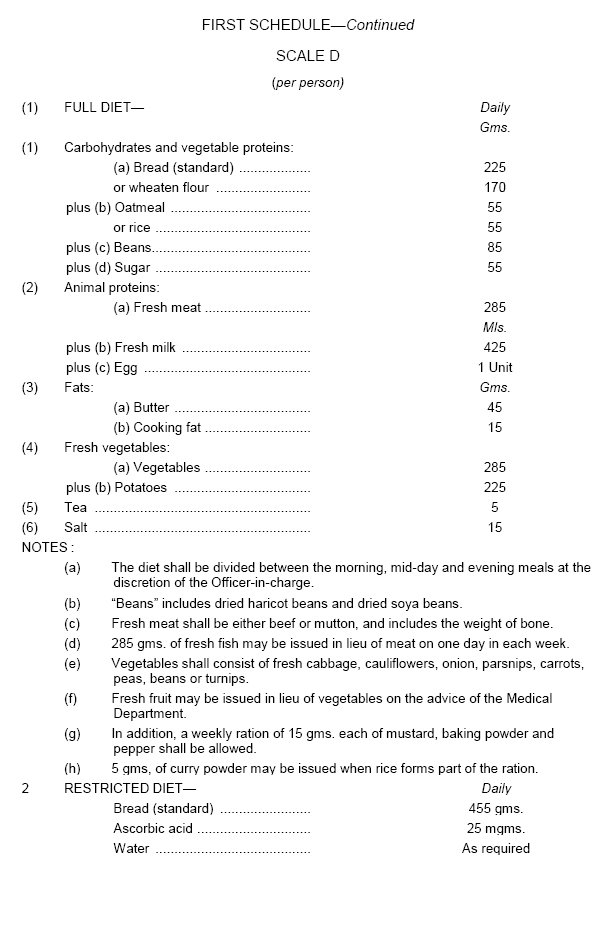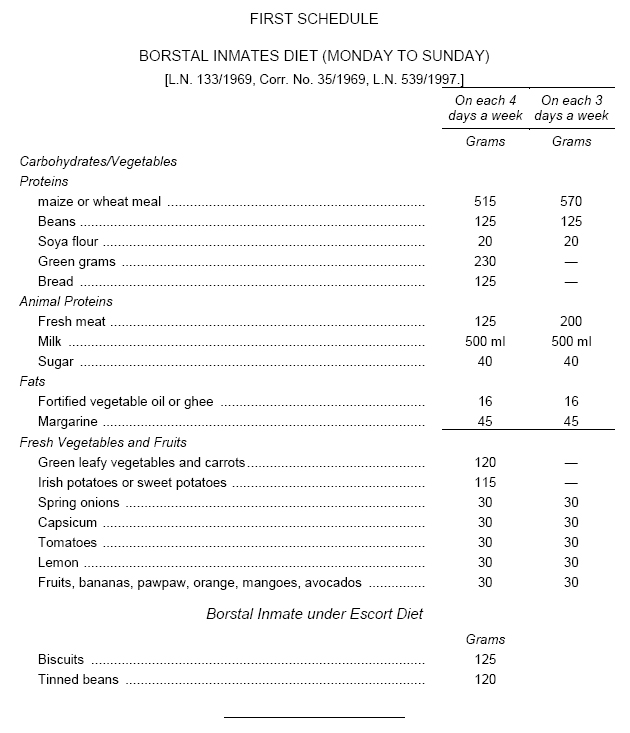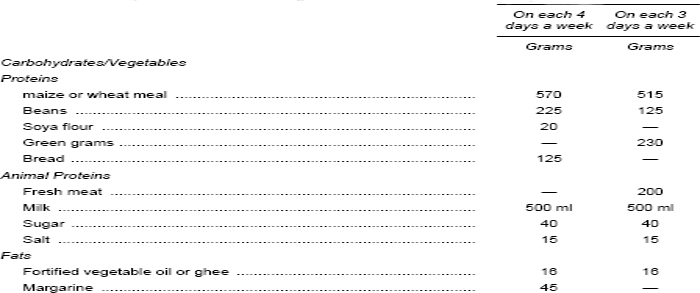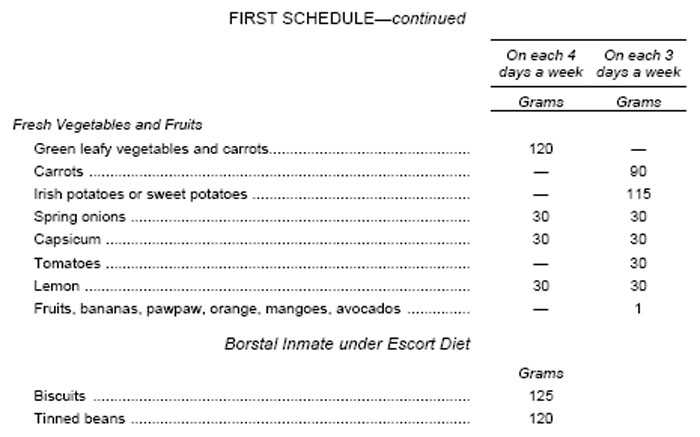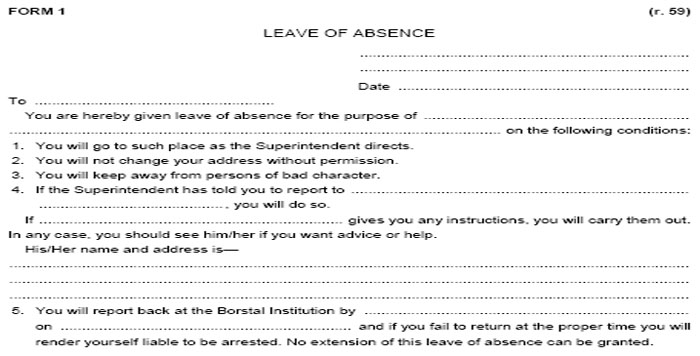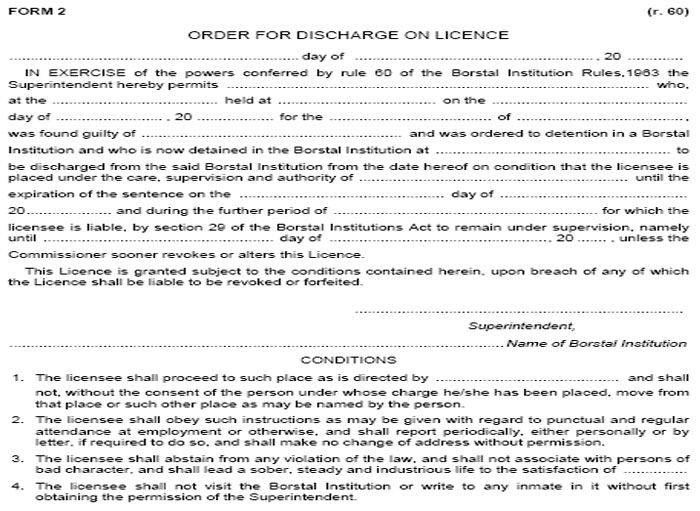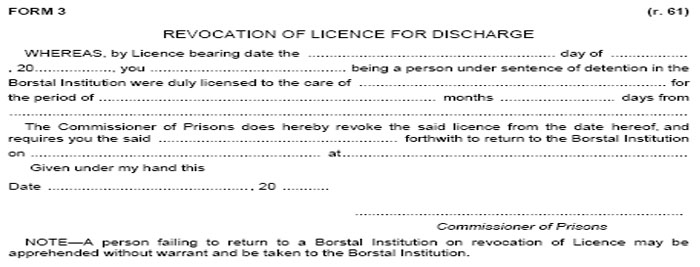|
|
BORSTAL INSTITUTIONS RULES, 1963
ARRANGEMENT OF RULES
PART I – PRELIMINARY
| 3. |
Control and administration.
|
PART II – CLASSIFICATION OF INMATES
| 4. |
Classification of inmates.
|
| 5. |
Inmates to be divided into grades.
|
PART III – MEDICAL OFFICERS AND THE HEALTH OF INMATES
| 7. |
Power of medical officer to delegate.
|
| 8. |
Medical officer to attend regularly.
|
| 9. |
Examination of inmates.
|
| 10. |
Frequency of medical examinations and inspections.
|
| 11. |
Medical officer may recommend modifications.
|
| 12. |
Medical officer to advice on removal of inmates.
|
| 13. |
Mental conditions of inmates.
|
PART IV – ACCOMMODATION IN AND GENERAL MANAGEMENT OF BORSTAL INSTITUTION
| 17. |
Sleeping accommodation.
|
| 18. |
Cleanliness of institution.
|
| 19. |
Confinement of inmates.
|
| 22. |
Children of female inmates.
|
| 25. |
Recording of particulars.
|
| 27. |
Medical examination on admission.
|
| 28. |
Information for inmates to be provided in rooms or dormitories.
|
| 29. |
Superintendent to ensure that information is understood.
|
| 30. |
Privacy during transfer.
|
PART V – TREATMENT OF INMATES
| 34. |
Cleanliness of clothe and bedding.
|
| 37. |
Complaints about food.
|
| 42. |
Postponement of privileges of letter and visits.
|
| 43. |
Visits to sick inmates.
|
| 44. |
Inmate may see an advocate.
|
| 46. |
Visits by police officers.
|
| 48. |
Religious instruction.
|
PART VI – DISCIPLINE OF INMATES
| 50. |
Borstal institution offences.
|
| 51. |
Inquiry into offences.
|
| 52. |
Medical examination before confinement or restricted diet.
|
| 56. |
Employment of inmates.
|
| 57. |
Work of female inmates.
|
PART VII – ABSENCE FROM BORSTAL INSTITUTION
| 60. |
Form of discharge on licence.
|
| 61. |
Revocation of licence.
|
PART VIII – ADMINISTRATION
| 62. |
General duty of officers.
|
| 63. |
Responsibilities of superintendent.
|
| 65. |
Duties of superintendent as to health.
|
| 66. |
Visitors to institution.
|
| 68. |
Principal borstal officer responsible for administering each house.
|
| 69. |
Officers attached to each house.
|
| 71. |
Officers to refrain from certain acts.
|
| 73. |
Officers to report cases of illness.
|
SCHEDULES
FIRST SCHEDULE – BORSTAL INMATES DIET (MONDAY TO SUNDAY)
Rules under section 52
BORSTAL INSTITUTIONS RULES, 1963
BORSTAL INSTITUTIONS RULES, 1963
[L.N. 596/1963, L.N. 310/1964, L.N. 133/1969, Corr. No. 35/1969, L.N. 539/1997.]
BORSTAL INSTITUTIONS RULES, 1963
[L.N. 596/1963, L.N. 310/1964, L.N. 133/1969, Corr. No. 35/1969, L.N. 539/1997, Corr. No. 21/1998.]
PART I – PRELIMINARY
| 1. |
Citation
These Rules may be cited as the Borstal Institutions Rules, 1963.
|
| 2. |
Interpretation
In these Rules, except where the context otherwise requires—
“inmate” means any person detained in a borstal institution, and includes any person granted leave of absence or licence under section 25 or section 26 of the Act;
“officer”, in relation to a borstal institution, means the superintendent, principal borstal officer or any prison officer posted to the staff of a borstal institution.
|
| 3. |
Control and administration
| (1) |
Every borstal institution shall be under the control of the Commissioner.
|
| (2) |
The general charge and administration of a borstal institution shall be vested in the superintendent.
|
|
PART II – CLASSIFICATION OF INMATES
| 4. |
Classification of inmates
The Commissioner shall classify all inmates having regard to their character, previous history and other relevant circumstances, and shall arrange for each inmate to receive his training at the borstal institution which in his opinion is most suitable.
|
| 5. |
Inmates to be divided into grades
| (1) |
Inmates shall be divided into such grades as the Commissioner may approve.
|
| (2) |
An inmate may be placed in the penal grade by order of the superintendent, for period no longer than is necessary, in the interests of the inmate or of another person if the superintendent is satisfied that such inmate is exercising a bad influence on other inmates, or is idle or ill-conducted.
|
| (3) |
While in the penal grade he shall not be employed in association with other inmates and shall receive no payment.
|
|
| 6. |
Institution Board
At every borstal institution there shall be an Institution Board, consisting of the superintendent and such other persons as the Commissioner may determine, who shall consider the case of an inmate before placing him in any grade and promoting him from one grade to another.
|
PART III – MEDICAL OFFICERS AND THE HEALTH OF INMATES
| 7. |
Power of medical officer to delegate
Subject to the directions of the Director of Medical Services, the medical officer may depute any of his functions or duties under this Part to any person who he considers is suitably qualified to carry out such functions or duties.
|
| 8. |
Medical officer to attend regularly
The medical officer shall attend at the borstal institution for which he is responsible either daily or at regular intervals.
|
| 9. |
Examination of inmates
The medical officer shall examine an inmate on each of the following occasions—
| (a) |
on the inmate’s admission to a borstal institution;
|
| (b) |
before the inmate is required to undergo any class of work of a more strenuous nature than that which he has been certified fit to undertake, and certify whether the inmate is fit to undergo the work;
|
| (c) |
before the inmate undergoes corporal punishment or any other punishment likely to affect his health, and certify whether the inmate is fit to undergo the punishment;
|
| (d) |
during the course of infliction of corporal punishment;
|
| (e) |
before the inmate is discharged from a borstal institution;
|
| (f) |
before the inmate is transferred to another borstal institution.
|
|
| 10. |
Frequency of medical examinations and inspections
The medical officer shall—
| (a) |
see every inmate at least once every month; and
|
| (b) |
inspect the inmate at work from time to time; and
|
| (c) |
at least once in every month inspect the whole institution paying particular attention to the cooking and sanitary equipment therein.
|
|
| 11. |
Medical officer may recommend modifications
As a result of his examinations and inspections, a medical officer may recommend modifications in labour, diet or punishment in relation to a particular inmate.
|
| 12. |
Medical officer to advice on removal of inmates
| (1) |
The medical officer shall advise the superintendent of the case of any inmate who he considers should be transferred from the borstal institution which he is in to a hospital, mental hospital or leper settlement.
|
| (2) |
The medical officer shall advise the superintendent of the case at any inmate who he considers should be released from a borstal institution by reason of his health being likely to be endangered by remaining in a borstal institution or of his being unlikely to survive his sentence or being permanently unfit for borstal discipline.
|
|
| 13. |
Mental condition of inmates
| (1) |
The medical officer shall keep observation on the mental health of all inmates.
|
| (2) |
The medical officer shall report to the superintendent any case where he considers an inmate is mentally disordered.
|
|
| 14. |
Spread of disease
The medical officer shall take all measures necessary to prevent the spread of infectious or contagious diseases.
|
| 15. |
Books to be kept
The medical officer shall keep the following books and records—
| (a) |
a case book showing the name, disease and treatment of every sick inmate;
|
| (b) |
a journal containing his comments and the state of the borstal institution and inmates;
|
| (c) |
a case book giving full details of the medical history, cause of death and treatment of every inmate who dies in the borstal institution; and
|
| (d) |
periodical reports on the nature and quality of the food of the inmates both before and after cooking.
|
|
| 16. |
Vaccination
If the medical officer considers it necessary for the health of any particular inmate or inmates, or for the health of other inmates or members of the public, he may arrange for the vaccination or inoculation of all or any of the inmates.
|
PART IV – ACCOMMODATION IN AND GENERAL MANAGEMENT OF BORSTAL INSTITUTION
| 17. |
Sleeping accommodation
| (1) |
The inmates shall sleep in rooms or dormitories as the superintendent directs in the case of each inmate.
|
| (2) |
The following provisions shall apply for the separation of the sexes—
| (a) |
male and female inmates shall be kept absolutely separate from each other and shall be confined in different buildings;
|
| (b) |
the rooms, dormitories and yards where female inmates are confined shall be secured by locks different from those securing the rooms, dormitories and yards allotted to male inmates;
|
| (c) |
female inmates shall in all cases be attended by women officers;
|
| (d) |
a male prison officer on the staff of the borstal institution shall not enter an institution or part of an institution appropriated to female inmates, except on duty and accompanied by a woman prison officer.
|
|
| (3) |
The medical officer shall certify the number of inmates that may sleep in any one room or dormitory.
|
|
| 18. |
Cleanliness of institution
The borstal institution and every room and part thereof shall be kept clean, and every inmate shall keep his room, dormitory, utensils, books and other articles issued for his use, and his clothing and bedding, clean and neatly arranged, as may be ordered and shall clean and sweep the yards, passages and other parts of the borstal institution as he may be ordered.
|
| 19. |
Confinement of inmates
In every borstal institution, rooms shall from time to time be set aside for the confinement of inmates undergoing punishment for borstal institution offences, and shall be certified as fit to be used for such purpose by the medical officer.
|
| 20. |
Admission
The superintendent shall, upon receiving an order under section 6 or section 7 of the Act, make all necessary arrangements for the transfer of the person in respect of whom the order is made to the borstal institution.
|
| 21. |
Search on admission
Every inmate shall be searched when taken into custody by the superintendent, on admission into a borstal institution and at such subsequent times as the superintendent directs, and all unauthorized articles shall be taken from him.
|
| 22. |
Children of female inmates
Subject to conditions that may be imposed by the Commissioner, the child of a female inmate may be admitted into the borstal institution with its mother and may be supplied with necessaries at public expense:
Provided that such child shall not be permitted to remain in the institution after it has attained the age of four years, or after arrangements for its proper care outside the institution have been made, whichever is the earlier.
|
| 23. |
Manner of search
| (1) |
An inmate shall be searched in as seemly a manner as is consistent with the necessity for discovering concealed articles.
|
| (2) |
An inmate shall be searched only by officers of the same sex as himself.
|
|
| 24. |
Inmate’s property
| (1) |
Subject to subrule (2) of this rule, all money, clothing or other effects belonging to an inmate which he is not allowed to retain shall be placed in the custody of the superintendent, who shall keep an inventory thereof, which shall be signed by the inmate.
|
| (2) |
All articles of a perishable nature, and all articles infected with vermin or otherwise likely to spread disease in a borstal institution, which are in the possession of an inmate on admission into a borstal institution shall be destroyed.
|
| (3) |
In any case where the clothes of an inmate are so old, worn out or dirty as to be useless, the superintendent shall order them to be destroyed, and, in such case, on the release of the inmate the superintendent shall give the inmate clothing of a suitable kind.
|
| (4) |
Articles which in the opinion of the superintendent are too bulky for storage shall not be accepted into the borstal institution.
|
| (5) |
On the discharge of an inmate, all articles of clothing and property shall be returned to him unless they have been destroyed under this rule.
|
| (6) |
If any inmate is discharged from a borstal institution and fails to claim his property within six months from his discharge, or if any inmate dies in the borstal institution and his personal representative or relatives do not claim his property within six months of his death, the superintendent may, if in his opinion such property is of no substantial value, destroy it, or if he considers it possible to sell it he shall sell it and devote the proceeds to the welfare of the inmates in the borstal institution generally.
|
|
| 25. |
Recording of particulars
| (1) |
The name, race, tribe, age, weight and particular marks, and such other measurements and particulars as may be required, in regard to an inmate shall upon his admission be recorded in such manner as the Commissioner directs.
|
| (2) |
At regular intervals of not less than once a month thereafter, his weight shall be recorded in such manner as may be directed by the Commissioner.
|
|
| 26. |
Baths
Every inmate shall, unless exempted by the superintendent or the medical officer, take a bath or shower on admission and thereafter whenever ordered by the superintendent.
|
| 27. |
Medical examination on admission
Every inmate shall, on the day of his admission or as soon as possible after his admission, be separately examined by the medical officer, who shall record the state of health of the inmate and such other particulars as may be directed:
Provided that when an inmate is received too late to be examined on the same day he shall be examined as soon as possible on the next day, and in any case within twenty-four hours of his admission.
|
| 28. |
Information for inmates to be provided in rooms or dormitories
Every inmate on admission to an institution shall be provided in his room or dormitory with sufficient information as to the rules concerning the disciplinary requirements of the borstal institution, to earnings and privileges and to the proper methods of submitting petitions to the President and of making complaints as to food, clothing, bedding and other necessaries.
|
| 29. |
Superintendent to ensure that information is understood
| (1) |
The superintendent shall, personally or through another officer, ensure that as soon as possible after admission into a borstal institution, and in any case within twenty-four hours, every inmate who can read has read the information so provided.
|
| (2) |
Where an inmate cannot read or has difficulty in understanding the information so provided, it shall be so explained to him that he may understand his rights and obligations.
|
|
| 30. |
Privacy during transfer
An inmate shall not be exposed to public view more than is necessary while being moved to or from a borstal institution.
|
PART V – TREATMENT OF INMATES
| 31. |
Use of force
| (1) |
An officer shall not punish any inmate unless authorized to do so under the Act or these Rules.
|
| (2) |
No officer shall deliberately act in a manner calculated to provoke an inmate.
|
| (3) |
If an officer strikes or uses force against an inmate, he shall have the inmate as soon as possible examined by the medical officer, and shall immediately report the incident to the superintendent.
|
|
| 32. |
Clothing
| (1) |
Every inmate shall be supplied with and shall wear such clothing as may be directed by the superintendent.
|
| (2) |
Additional or alternative clothing may be supplied to an inmate on the recommendation of the medical officer, or by order of the superintendent.
|
|
| 33. |
Bedding
| (1) |
Every inmate shall be supplied with bedding adequate for warmth and health.
|
| (2) |
Additional or alternative bedding may be supplied to an inmate on the recommendation of the medical officer.
|
|
| 34. |
Cleanliness of clothe and bedding
| (1) |
The clothes of an inmate shall be changed and washed at least weekly, and bedclothes shall be washed and aired as often as the superintendent directs.
|
| (2) |
The borstal institution clothing and bedding left by an inmate on discharge shall be thoroughly washed, dried and disinfected before being returned to store or reissued.
|
|
| 35. |
Food
| (1) |
Every inmate shall be entitled to a sufficient quantity of plain, wholesome food, in accordance with Scale A in the First Schedule to these Rules.
Provided that regard shall be had to the mode and standard of life of an inmate before he was admitted into a borstal institution, and if the superintendent after consultation with the medical officer is satisfied that an inmate is not accustomed to the type of diet laid down in Scale A he may order that the inmate shall be given a diet in accordance with Scale B, Scale C or Scale D in that Schedule.
|
| (2) |
A copy of the diet scales shall be displayed in some conspicuous place in the borstal insitution.
|
| (3) |
The diet of an inmate who persistently wastes his food may be reduced by the superintendent after obtaining the written advice of the medical officer.
|
| (4) |
An inmate ordered restricted diet shall have his ordinary diet replaced by the restricted diet set out in the First Schedule to these Rules, unless the medical officer otherwise recommends.
|
|
| 35. |
Food
| (1) |
Every inmate shall be entitled to a sufficient quantity of plain, wholesome food, in accordance with the borstal inmates diet set out in the First Schedule.
|
| (2) |
A copy of the diet scale shall be displayed in a conspicuous place in the borstal institution.
|
| (3) |
The diet of an inmate who wastes food may be reduced by the superintendent after obtaining the written advice of the medical officer.
|
|
| 36. |
Extra food
No inmate shall receive or have in his possession any food other than the allowance authorized by the diet scales, except—
| (a) |
with the authority of the superintendent; or
|
| (b) |
with the authority of the medical officer, if a variation diet is ordered on medical grounds.
|
|
| 37. |
Complaints about food
An inmate who has any complaint to make regarding food supplied to him shall make it to the superintendent or principal borstal officer immediately after the food is served.
|
| 38. |
Personal hygiene
Every inmate shall obey such directions as may be given to him by the superintendent about washing, bathing, shaving and haircutting.
|
| 39. |
Inmates’ hair
The hair of female inmates shall not be cut on admission or afterwards unless the medical officer considers it to be necessary for health and cleanliness or the inmate expresses a desire to have her hair cut.
|
| 40. |
Exercise
An inmate shall take regular physical exercise in accordance with instructions issued by the superintendent, unless he is exempted by the medical officer for reasons of health.
|
| 41. |
Visits and letters
| (1) |
Communications between inmates and other persons shall be allowed only in accordance with this rule, and the superintendent may restrict such communications still further if he thinks it necessary for the maintenance of discipline and order in the borstal institution and the welfare of the inmates.
|
| (2) |
Save as provided in subrule (3), visits and letters shall be governed by the following rules—
| (a) |
on admission an inmate shall be entitled to write and receive one letter;
|
| (b) |
an inmate shall be entitled to write one letter every week to persons approved by the superintendent and to receive letters as often as the superintendent considers desirable;
|
| (c) |
an inmate shall be entitled to receive one visit of thirty minutes duration every month from three persons on such conditions relating to visits as may be imposed by the superintendent.
|
|
| (3) |
The superintendent may allow an inmate to write a special letter and to receive a reply or to receive a special visit at his discretion.
|
| (4) |
The superintendent shall at any time communicate to an inmate, or to his relatives or friends, any matter which he thinks likely to be of importance to such inmate.
|
| (5) |
The degree of supervision to be exercised during visits to inmates shall be within the discretion of the superintendent.
|
|
| 42. |
Postponement of privileges of letter and visits
| (1) |
The privilege of writing and receiving letters and receiving visits may, at the discretion of the superintendent, be postponed at any time in case of misconduct, but shall not be subject to forfeiture.
|
| (2) |
When an inmate who becomes entitled to a letter or visit is at the time undergoing punishment, the superintendent shall defer the privilege to a suitable time.
|
|
| 43. |
Visits to sick inmates
If an inmate dangerously ill desires to be visited by a near relative or friend, the superintendent may give an order in writing for the admission of that relative or friend.
|
| 44. |
Inmate may see an advocate
| (1) |
Reasonable facilities shall be allowed for the advocate of an inmate to see him on any legal matter in the sight of but not in the hearing of an officer of the institution.
|
| (2) |
For the purposes of this rule, “advocate of an inmate” means either the inmate’s advocate himself or the advocate’s clerk.
|
|
| 45. |
Letters to be read
Every letter to or from an inmate shall be read by the superintendent, or by an officer deputed by him for the purpose, and it shall be within the discretion of the superintendent to stop any letter, on the grounds that he considers its contents are objectionable or that it is of inordinate length.
|
| 46. |
Visits by police officers and process servers
| (1) |
On the production of an order from a magistrate, from the Inspector-General, from the Regional Commissioner of Police, or from a gazetted officer as defined in the Police Act (Cap. 84), a police officer may at any reasonable time, visit an institution and interview an inmate for any of the following purposes—
| (b) |
taking statements considered necessary for any investigation;
|
| (c) |
any other purpose authorized in writing by the Inspector-General of Police, Regional Commissioner of Police or gazetted officer.
|
|
| (2) |
The superintendent shall direct whether a visit by a police officer to an inmate shall take place in or out of the hearing or sight of an officer.
|
|
| 47. |
Education
| (1) |
The superintendent shall make provision for educational classes for the inmates.
|
| (2) |
A library for the use of inmates shall be provided in every borstal institution, and every inmate shall be permitted to draw books from the library in accordance with the Commissioner’s directions.
|
| (3) |
The superintendent may arrange for lectures, concerts and debates for inmates to take place outside the hours of work.
|
|
| 48. |
Religious instruction
| (1) |
Adequate arrangements shall be made for the provision of religious instruction to inmates according to their religious beliefs.
|
| (2) |
Every inmate shall on admission be furnished with such religious books of his faith as are obtainable in the borstal institution.
|
|
| 49. |
Complaints
| (1) |
Any request by an inmate to see the Commissioner or a member of the Board of Visitors shall be recorded by the officer to whom it is made and conveyed without delay to the superintendent, who shall inform the Commissioner or a member of the Board of Visitors, as the case may be, of any such request.
|
| (2) |
The superintendent shall at a convenient hour every day, other than Sundays and Public Holidays, hear the complaints of all inmates who have requested to see him.
|
|
PART VI – DISCIPLINE OF INMATES
| 50. |
Borstal institution offences
| (a) |
disobeys any order of the superintendent or of any other officer or any borstal institution rule;
|
| (b) |
is idle, careless or negligent at work or refuses to work;
|
| (c) |
is indecent in language, act or gesture;
|
| (d) |
escapes from the borstal institution or from lawful custody;
|
| (e) |
mutinies or incites other inmates to mutiny;
|
| (g) |
leaves his room or dormitory or place of work or other appointed place without permission;
|
| (h) |
wilfully disfigures or damages any part of the borstal institution or any property which is not his own;
|
| (j) |
has in his possession any unauthorized articles, or attempts to obtain such an article;
|
| (k) |
gives to or receives from any person any unauthorized articles;
|
| (l) |
makes repeated and groundless complaints;
|
| (m) |
in any way offends against good order and discipline;
|
| (n) |
attempts to do any of the foregoing things; or
|
| (o) |
aids or abets the doing of any of the foregoing things,
|
shall be guilty of a borstal institution offence.
|
| 51. |
Inquiry into offences
| (1) |
When an inmate has been reported for a borstal institution offence, the superintendent may order him to be kept apart from other inmates pending adjudication.
|
| (2) |
Before a report is dealt with, the inmate shall be informed of the offence for which he has been reported and shall be given an opportunity of hearing the facts alleged against him and of being heard in his defence.
|
| (3) |
Every report against an inmate shall be heard without delay.
|
|
| 52. |
Medical examination before confinement or restricted diet
No inmate shall be subjected to confinement to a room or to a restricted diet, until certified as medically fit to undergo such punishment.
|
| 53. |
Corporal punishment
| (1) |
Corporal punishment shall be inflicted in the presence of the superintendent and the medical officer.
|
| (2) |
Before corporal punishment is inflicted the medical officer shall examine the inmate and satisfy himself that he is in a fit condition of health to undergo the punishment and shall make such recommendation for preventing injury to the inmate’s health as he may deem necessary, and the superintendent shall carry such recommendations into effect.
|
| (3) |
At any time after the infliction of punishment has commenced the medical officer may, if he deems it necessary in order to prevent injury to the inmate’s health, recommend that no further punishment be inflicted, and the superintendent shall thereupon remit the remainder of the punishment.
|
| (4) |
The superintendent shall enter in the corporal punishment book the order for corporal punishment, the hour at which the punishment was inflicted, the number of strokes inflicted, the recommendations of the medical officer and any order which he may have given as to remission.
|
| (5) |
Corporal punishment shall be inflicted with a light cane on the buttocks.
|
| (6) |
Corporal punishment shall not be inflicted by instalments.
|
|
| 54. |
Restricted diets
| (1) |
The restricted diets which may be awarded under section 33 of the Act shall be those prescribed in the First Schedule:
Provided that, where such diet is ordered for a longer period than three days, the offender shall receive one day’s full diet on every fourth day.
|
| (2) |
On the days when restricted diet is ordered, an inmate shall not be required to work but may perform any suitable work if he so desires.
|
| (3) |
No inmate who has been on restricted diet shall be placed upon this diet for a new offence until an interval has elapsed equal to the period already spent by the inmate on restricted diet.
|
|
| 55. |
Restraint
| (1) |
No inmate shall be placed in handcuffs or other mechanical restraint as a punishment, and an inmate shall be so restrained only if it is necessary to prevent him from—
| (a) |
causing injury to himself or injury to another person; or
|
|
| (2) |
No means of mechanical restraint shall be used which has not been approved by the Commissioner.
|
| (3) |
No inmate shall be kept under mechanical restraint unless the medical officer has certified that such restraint will not injure his health.
|
| (4) |
An order to place an inmate under mechanical restraint shall—
| (a) |
be made only in case of urgent necessity;
|
| (b) |
be made by the superintendent, who shall notify the Commissioner immediately;
|
| (c) |
not be continued for longer than twenty-four hours without the permission of the medical officer, and in such cases, the Commissioner shall be notified immediately;
|
| (d) |
be notified immediately to the medical officer; and
|
| (e) |
be entered in such journals and books as the Commissioner directs.
|
|
| (5) |
The superintendent may order any refractory or violent inmate to be temporarily confined in a special room for such period as may be necessary.
|
|
| 56. |
Employment of inmates
| (1) |
Every inmate shall be required to engage in useful work, all of which so far as is practicable shall be performed in association with other inmates either on the necessary services of the borstal institution, or in workshops or on outdoor work; and shall be instructed, as far as possible, in useful occupations which may help him to earn his livelihood on discharge.
|
| (2) |
No inmate shall be set to any work unless he has been certified as fit for that type of work by the medical officer.
|
| (3) |
Every inmate who has not been exempted by the medical officer shall be required to work at least forty-two hours a week and shall in addition to work attend educational classes as required.
|
| (4) |
In each borstal institution there shall be a scheme approved by the Minister under which inmates may receive payment for work done.
|
| (5) |
Inmates participating in the earnings scheme shall be classified in the following grades—
| Grade |
A—inmates who in the opinion of the Commissioner are of exemplary conduct and are skilled in their trade, and inmates who are placed in a position of trust and responsibility and are promoted by the Commissioner to be prefects;
|
| Grade |
B—inmates who in the opinion of the superintendent are of good conduct and are semi-skilled in their trade;
|
| Grade |
C—inmates who are eligible to participate in the earnings scheme but who are not in grade A or grade B.
|
|
| (6) |
Promotion to Grade A shall be made by the Commissioner, and promotion to Grade B by the superintendent.
|
|
| 57. |
Work of female inmates
Female inmates shall be employed in association with female inmates and on work suitable for them.
|
| 58. |
Holidays
| (1) |
Except where the Commissioner otherwise directs, inmates shall not be required to do any work, other than keeping the borstal institution clean and preparing food, on Sundays and public holidays.
|
| (2) |
The superintendent may, in his discretion, make special arrangements for the observation by any inmate of his religious and national festivals.
|
|
PART VII – ABSENCE FROM BORSTAL INSTITUTION
| 59. |
Leave of absence
Where the Commissioner allows an inmate to be absent from the borstal institution under section 25 of the Act, he shall issue to the inmate a leave of absence in Form 1 in the Second Schedule to these Rules.
|
| 60. |
Form of discharge on licence
| (1) |
An order for discharge on licence shall be in Form 2 in the Second Schedule to these Rules.
|
| (2) |
When an inmate is discharged on licence under subrule (1) of this rule, the After-Care Committee shall be given such information and assistance as may be necessary by the superintendent to ensure a proper and regular supervision of the inmate.
|
|
| 61. |
Revocation of licence
| (1) |
An inmate whose licence is revoked may, on re-admission to a borstal institution, be detained in the penal grade for such length of time as the superintendent deems necessary, having regard to all the circumstances of the case.
|
| (2) |
Revocation of licence shall be in Form 3 in the Second Schedule.
|
|
PART VIII – ADMINISTRATION
| 62. |
General duty of officers
| (1) |
It shall be the duty of an officer of a borstal institution to carry out his duties and responsibilities in accordance with the Act, these Rules and any standing orders, administrative directions or general or special instructions issued by the Commissioner.
|
| (2) |
Any breach of or non-compliance by an officer of the borstal institution with any of the provisions of the Act, these Rules or any standing orders, administrative directions or general or special instructions issued by the Commissioner shall be a disciplinary offence.
|
| (3) |
The conditions of service of the officers of the borstal institution shall be subject to Part XI of the Prison Rules, 1963 (L.N. 60/1963).
|
| (4) |
Nothing in this or any other rule shall be so construed as to exempt any officer of a borstal institution from being prosecuted under the Act or any other written law in respect of any act or omission that is an offence under the Act or any other written law:
Provided that an officer shall not be punished twice for the same offence or disciplinary offence.
|
|
| 63. |
Responsibilities of superintendent
| (1) |
The superintendent shall be responsible for the maintenance of discipline in the borstal institution.
|
| (2) |
In carrying out his duties under this rule, the superintendent shall be responsible for all property in the borstal institution and shall—
| (a) |
keep or cause to be kept the following books and records—
| (i) |
an inventory of the furniture and tools in the borstal institution; |
| (ii) |
a diary, in which all acts, events or occurrences of importance within the borstal institution shall be recorded; |
| (iii) |
a record of all inmates committed to the borstal institution, showing the date and period of commitment of inmates, the names and addresses of their parents (if known) and their general appearance, race, language, nationality, apparent age, health, height and weight; |
| (iv) |
a record of the conduct and health of the inmates; |
| (v) |
a visitor’s book for the entry of observations by visitors; |
| (vi) |
an account of all materials purchased for use in the workshops of the borstal institution and the disposal thereof; |
| (vii) |
a record of all articles manufactured in the borstal institution of all sales of such articles, showing cost of materials, transport and other incidental expenses; and |
| (viii) |
an inmate’s property book in the form approved by the Commissioner. |
|
|
| (3) |
In the absence of the superintendent the Commissioner may appoint any officer to perform all or any of the duties required to be performed by the superintendent.
|
| (4) |
The superintendent and the principal borstal officer shall not be absent from the borstal institution at the same time.
|
| (5) |
The principal borstal officer, prison officers on the staff of the borstal institution and other members of the staff shall be under the order of the superintendent and shall not be absent from the borstal institution without the leave of the superintendent.
|
|
| 64. |
Special duties
| (1) |
The superintendent shall—
| (a) |
exercise a close and constant personal supervision of the whole borstal institution;
|
| (b) |
visit and inspect every part of the borstal institution once a day where inmates are employed or confined and give special attention to every inmate who for any reason is confined to his room or is a patient in the borstal institution’s infirmary;
|
| (c) |
visit every part of the borstal institution at night at an uncertain hour at least twice in every fortnight and satisfy himself as to the state of the borstal institution; and
|
| (d) |
interview each inmate immediately after admission to the borstal institution and before his discharge.
|
|
|
| 65. |
Duties of superintendent as to health
| (1) |
The superintendent shall—
| (a) |
ensure so far as is practicable that the medical officer’s instructions and recommendations in regard to any inmate are carried out;
|
| (b) |
upon the dangerous illness of any inmate, give immediate notice thereof to the most easily accessible known relative of the inmate;
|
| (c) |
upon the death of an inmate, give immediate notice thereof to the nearest magistrate empowered to hold an inquest, and to the relatives of the deceased, and report the death to the Commissioner;
|
| (d) |
without delay, report to the Commissioner any case in which the medical officer is of the opinion that the mental state of any inmate is becoming impaired or enfeebled by continued discipline or treatment, or that the life of any inmate will be endangered by further detention, or that any sick inmate will not survive his period of detention or is totally and permanently unfit for the discipline of the borstal institution;
|
| (e) |
without any delay, report to the medical officer and to the Commissioner any case of mental disorder or apparent mental disorder; and
|
| (f) |
pay special attention to the ventilation, drainage and sanitary condition of the borstal institution, and take such measures as may be necessary for the proper maintenance of the borstal institution.
|
|
|
| 66. |
Visitors to institution
| (1) |
The Commissioner and the superintendent may, in the exercise of their discretion, allow any person to visit the borstal institution.
|
| (2) |
No person visiting a borstal institution shall, without the permission of the superintendent, make any sketch, or take any photograph, and this permission shall not be granted unless an undertaking is given that the sketch or photograph will not be published without the authority of the Commissioner.
|
| (3) |
The superintendent may remove any visitor from the borstal institution whose conduct is improper.
|
|
| 67. |
Fire precautions
| (1) |
The superintendent shall take care that proper precautions against fire are adopted, and that the appliances for the extinction of fire are at all times kept in good order and ready for use.
|
| (2) |
The superintendent shall take care that instructions are given as to the steps to be taken in case of fire and that officers concerned are acquainted with their duties in such an event.
|
|
| 68. |
Principal borstal officer responsible for administering each house
Where a borstal institution is divided into houses, a principal borstal officer shall be responsible for the administration of each house, subject to the general directions of the superintendent.
|
| 69. |
Officers attached to each house
One or more prison officers on the staff of the borstal institution may be attached to each house, and shall be subject to the directions of the principal borstal officer in charge of the house.
|
| 70. |
General duties
Principal borstal officers and prison officers on the staff of the borstal institution shall devote themselves to the mental, physical and moral development of each inmate under their charge.
|
| 71. |
Officers to refrain from certain acts
No officer of a borstal institution shall—
| (a) |
use force unnecessarily in dealing with inmates, nor where the application of force is necessary, otherwise than in a reasonable manner;
|
| (b) |
discuss his duties or any matters of discipline or of institutional arrangements within the hearing of an inmate;
|
| (c) |
carry out any pecuniary or business transactions with any inmate or on his behalf with any person;
|
| (d) |
except with the authority of the superintendent, bring in or carry out any prohibited article to or for any inmate;
|
| (e) |
have any interest, directly or otherwise, in any contract with the borstal institution or with any contractor or other interested party on any work connected with the borstal institution;
|
| (f) |
receive any fee, gratuity or other consideration for admitting any visitors to enter a borstal institution or to visit any inmates;
|
| (g) |
make any unauthorized communication to a representative of the press or any other persons about matters which have become known to him in the course of his official duties;
|
| (h) |
except with the authority of the Commissioner, publish any matter or make any public pronouncement about the borstal institution, the inmates or the administration of the institution.
|
|
| 72. |
Officers’ quarters
| (1) |
The officers of the borstal institution shall occupy the quarters the Commissioner assigns to them, and shall vacate them when required to do so.
|
| (2) |
The principal borstal officer and prison officers on the staff of a borstal institution living within an institution shall not permit any person who is not a regular member of his household to remain for the night in his quarters without the permission of the superintendent.
|
|
| 73. |
Officers to report cases of illness
The principal borstal officer and prison officers on the staff of the borstal institution shall direct the attention of the superintendent to any inmate who may appear to be in poor health, although not complaining of illness, or whose state of mind may appear deserving of special notice and care, so that the opinion and instructions of the medical officer may be obtained.
|
FIRST SCHEDULE
BORSTAL INMATES DIET (MONDAY TO SUNDAY) [L.N. 133/1969, Corr. No. 35/1969.]
FIRST SCHEDULE
BORSTAL INMATES DIET (MONDAY TO SUNDAY) [L.N. 133/1969, Corr. No. 35/1969, L.N. 539/1997.]
FIRST SCHEDULE
BORSTAL INMATES DIET (MONDAY TO SUNDAY) [L.N. 133/1969, Corr. No. 35/1969, L.N. 539/1997, Corr. No. 21/1998.]
|



